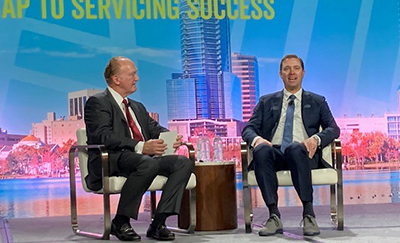
#MBAServicing23: Shon Hopwood’s Road to Redemption

(MBA Chairman-Elect Mark Jones (l) with Shon Hopwood at MBA Servicing23 in Orlando.)
ORLANDO—Shon Hopwood’s road to success is not your typical story—which makes his success all the more remarkable.
Hopwood is an author, lawyer and professor of criminal justice at Georgetown University who has twice had petitions accepted by the U.S. Supreme Court. He is also, as he readily attested here at the MBA Servicing Solutions Conference & Expo, a convicted bank robber.
Following college (University of the Midlands) and a stint in the Navy, Hopwood returned to his home state in Nebraska, when, sitting a bar one night, a friend asked him if he wanted to rob a bank.
“I didn’t see the downside at the time,” he said.
Hopwood and his colleagues targeted rural banks in Nebraska in towns that didn’t have police forces. Before their capture and arrests, he and his accomplices nabbed more than $150,000.
Hopwood was convicted and sentenced to 11 years in federal prison. “I soon realized I didn’t like it there,” he said. He found solace in the prison library, where he quickly realized he had a knack for law.
“When you’re in prison, the most important thing in your life is getting out of prison,” he said.
Hopwood read thousands of legal briefings. And when a fellow inmate asked him to file a brief to the Supreme Court, he agreed. Months later, he learned that SCOTUS had granted the petition and agreed to hear the case.
“I became very popular in federal prison,” Hopwood said. “I got lots of requests from inmates seeking some ray of hope.”
While still in prison, Hopwood got a second petition granted by the Supreme Court. Both cases succeeded, as did other cases in lower courts. At this point, he decided law would be his career. “Seeing how I was able to help other people changed my whole approach on life and encouraged me to change my outlook,” he said.
Out of prison in 2008, Hopwood set his sights on law school—but his conviction proved to be an obstacle. “I couldn’t even get a job as a used car salesman,” he said. However, he did find a position with a law research firm. From there, with the help of lawyers he had worked with in prison, he was accepted into the University of Washington School of Law. Following a clerkship with a judge in Washington, D.C., he was accepted into a fellowship program at Georgetown University—ironically, one of the law schools who initially turned him down.
And when Georgetown had an opening for a law professor, Hopwood applied for the position—and was hired. “It’s kind of cool that I work for a law school that would not accept me into its program,” he said.
Hopwood’s story is readily accessible—he’s appeared on 60 Minutes, been profiled in the New York Times, The Washington Post, The New Yorker and NPR. He has lectured extensively and even presented with the judge who sentenced him to prison.
“I talk about the need for second chances,” Hopwood. “I truly believe people shouldn’t be judged for their worst day or a bad decision. I think the purpose of prison should be rehabilitation and the belief that once you get out, you have the opportunity to change your life.”
Hopwood said he hoped his legacy is that he helped his students. “And I want to see real reform in the criminal justice system,” he said. “So many people are in prison because a judge wanted to make them an example, thinking it will have some sort of impact of human behavior. It doesn’t work, and I hope to change that.”
